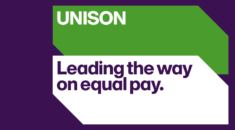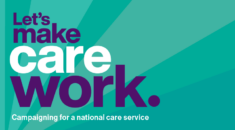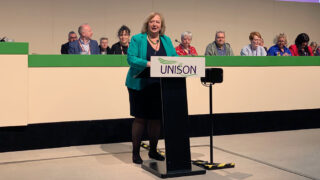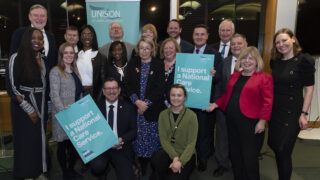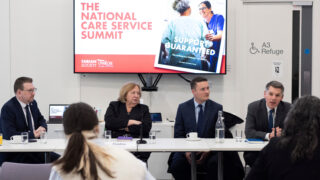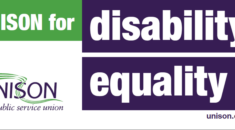January saw the union launch a campaign to encourage local government pension funds to divest from carbon – in other words, to pull their hard-earned money out of environment-unfriendly businesses.

Some £16bn of local government pension funds is invested in fossil fuels and, with five million members in those schemes, the campaign can make an impact.
Later that month, the higher education service group conference met in Chester.
“We have to stand up for our members’ rights,” delegates agreed – particularly in the face of Brexit.
Just over 10% of all university workers come from elsewhere in the EU and many “are frightened,” said Rose Babbage from the University of Leeds, “especially as the situation changes every week”.

At Black members’ conference in Liverpool, Councillor Yvonne Mosquito won the third UNISON Nelson Mandela Award, in recognition of over 37 years of dedicated campaigning and organising in her local community in Birmingham.
Fast forward to February, when everyone got excited about the centenary of women getting the vote. Well, women over 30. Women over 30 who owned their own houses.
But hey – it was a start and, with beautiful happenstance, the anniversary coincided with our women’s conference in Liverpool, where Mr Prentis praised “the biggest gathering of women trade unionists in this country” and president Margaret McKee hailed them all as “amazing”.

Campaigning and perseverance make a difference. UNISON’s fight to make the government act positively across public service pay has been long and hard. It’s not over, but in March, we were in the news for spearheading a breakthrough on NHS pay in England.
Health unions, employers and the government agreed a proposed framework for a new-look Agenda for Change, after months of negotiations in which UNISON took a leading role.
A consultation saw 84% of members approve it, leading to pay rises of at least 6.5% over the next three years for most staff in England.

During National Apprenticeship Week, the union celebrated some laudable apprenticeship schemes including one in Dorset, where joint work from UNISON and Borough of Poole Council’s HR team provides support and training for apprentices.
The campaign to win a better deal for homecare workers and their clients received a fillip in March, when Manchester City Council announced a £1 an hour rise for its carers.
Homecare assistants saw their wage increase to £8.75 an hour – the Manchester living wage.
The council also declared that home visits in Manchester will now be a minimum of 30 minutes, after signing UNISON’s Ethical Care Charter in October 2017.
April opened with the union accepting the local government pay offer for England, Wales and Northern Ireland after consultation with branches.
The two-year deal included a 16% pay increase for those on the lowest scale and a pay increase of between 15% and 4.3% for those points 7 to 28 of the salary scale.
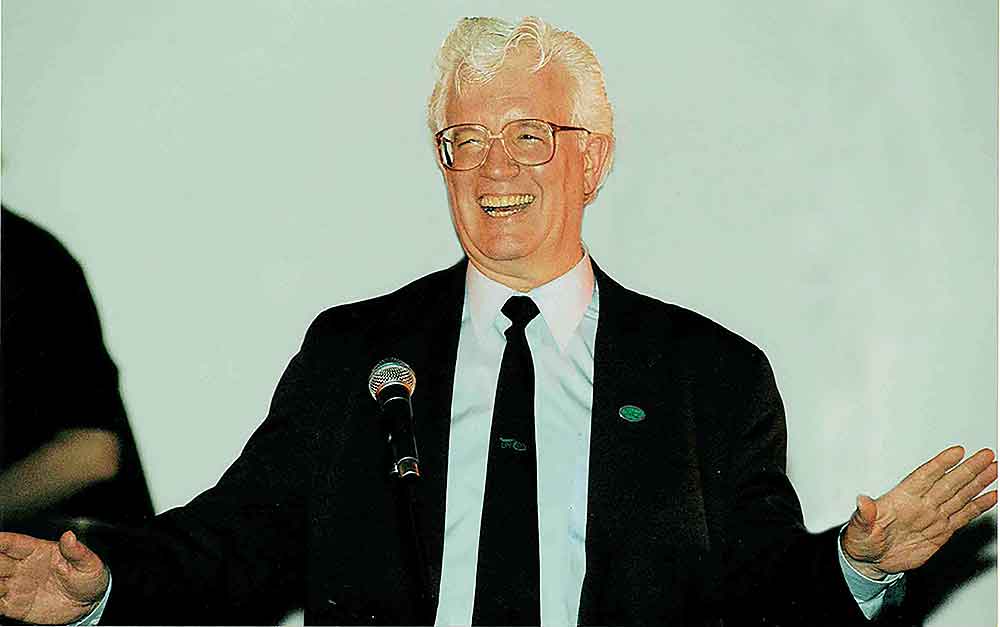
And lest we forget, there was a memorial service for union movement giant and UNISON legend – Rodney Bickerstaffe.
And so to May, when UNISON members from across the country poured into London for a national TUC march and rally.
A samba band, a giant flag, maracas and vuvuzelas, glitter, giant balloons and banners added a festive air to a wet capital. But the message was serious: after eight years of austerity, working people and public services need a new deal.

If it’s June, it’s national delegate conference – the annual parliament that sets the priorities and policies for the year ahead.
There was a special theme to this year’s conference in Brighton – our 25th. Yes, UNISON was formed on 1 July 1993 and conference saw the start of our birthday celebrations. As Dave Prentis put it: “We’re just getting started.”
But conference was also about making sure we provide greater support for members working in the private sector (the fastest growing group of members), making young workers key to organising and campaigning work, and dealing with the consequences of Brexit.

The agenda gave delegates representing ordinary UNISON members the opportunity to discuss, and decide on, the key issues facing public service workers.
Scottish mental health nurse Gordon McKay was elected president, with local government administrative officer Josie Bird, from Newcastle, and care worker Sian Stockham, from Abergavenny in Monmouthshire, as vice presidents.

The same week also saw three annual service group conferences – local government, energy, and water, environment and transport.
The Windrush scandal saw it emerge that the government had been threatening – and acting against – British citizens who arrived in the country as part of the Windrush generation of post-war Caribbean migrants who helped keep public services working, and many of whose children and grandchildren do the same to this day.
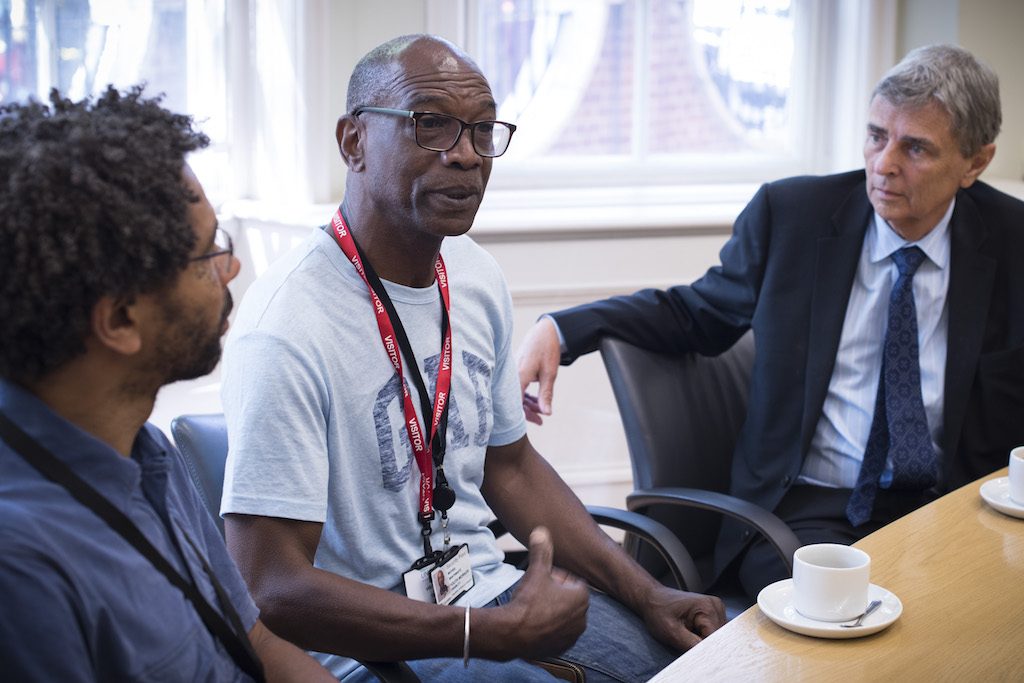
One of those was UNISON member Michael Braithwaite, a school teaching assistant who lost his job and was threatened with deportation.
He turned to his local union contact for help and shared his story with the union.
July saw the NHS celebrate its 70th birthday and, as the NHS’s biggest and best union, we asked Hollywood star and NHS uber-fan Michael Sheen to surprise the first person born in it.
Just before the anniversary proper there was a big NHS march and rally (it wouldn’t be a proper UNISON year without a march and rally every few weeks).
It was a fitting time for a UNISON-led victory over the increasingly common attempts by hospital trusts to outsource some of their staff into wholly owned subsidiary companies. Wrightington, Wigan and Leigh Foundation Trust dropped plans to transfer more than 900 workers, including porters, cleaners and catering staff, to one such subsidiary.
The plans had been subject to a long-running campaign and dispute led by UNISON, with members backing industrial action on a magnificent 79% turnout. They had also travelled to Brighton the month before to press their case at national delegate conference.
Also in July, UNISON legal officer Shantha David was named Human Rights Lawyer of the Year by civil rights campaigner Liberty for her leading role in UNISON’s landmark legal victory on employment tribunal fees.
And so to August – a month book-ended by continuing industrial action from Birmingham care workers, while the union sought leave to appeal to the Supreme Court in the fight for care workers to be paid the minimum wage when working sleep-in shifts.
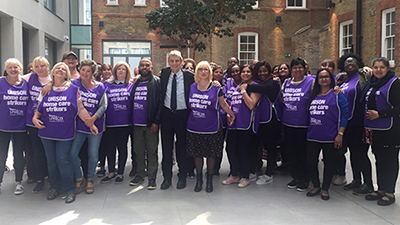
UNISON Scotland health workers voted 94% ‘yes’ for a three-year pay deal that will see their wages rise by at least 9%, while members in Wales also backed their offer.
Members at University Hospitals of Leicester and Mid Yorkshire NHS Hospitals Trust celebrated after plans to change their employment were scrapped by trusts, following campaigning and preparations for industrial action by UNISON.
September saw low-paid cleaners at Basildon University Hospital win a 3% pay rise, backdated to April, and will be returned to full NHS contracts this month, having been on the minimum wage since transferring back into the NHS from private contractor OCS in 2016.
Another outsourcing U-turn – this time by the Tees, Esk and Wear Valleys Trust – was a “fantastic victory”. The trust planned to outsource more than 500 non-clinical staff to a private company it had formed, but backed down after opposition from UNISON, the RCN and MPs.
Meanwhile, council workers went to Westminster to tell MPs that local services have reached breaking point and to promote UNISON’s campaign to #SaveOurLocalServices.
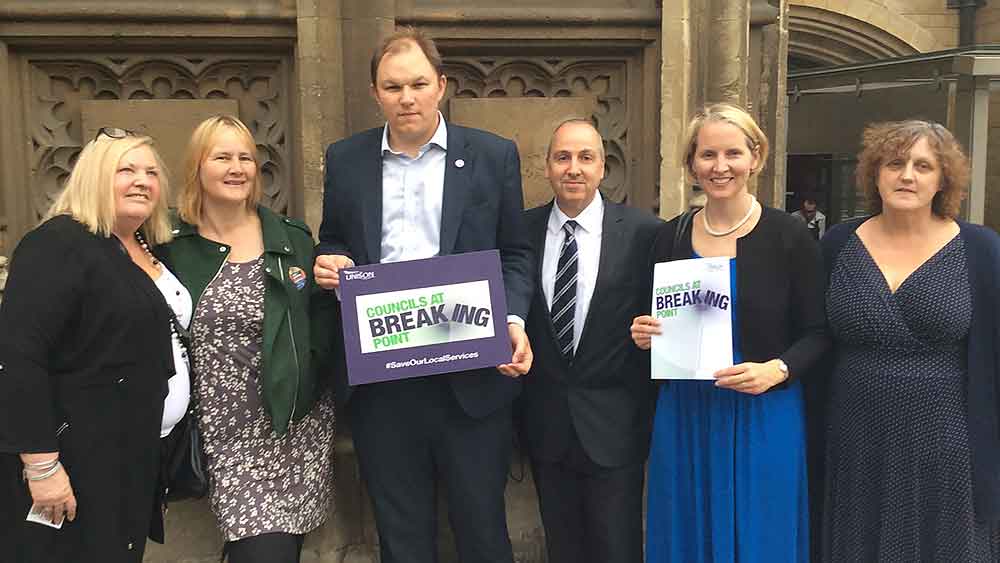
We published a report containing a shocking statistic. Public services support staff are doing more than 40 million hours of unpaid overtime a year. That’s the equivalent of 25,000 extra full-time staff and shows the impact of cuts – and how far workers go to keep services running.
During the Labour Party conference, Dave Prentis welcomed the economic alternative put forward by shadow chancellor John McDonnell, noting that “working people need a Labour government and an end to Tory austerity rule.”
In October, a two-day strike by facilities workers in Bolton, Lancashire, scored a clear victory.
Employed by iFM Bolton – set up last year and owned by the Bolton hospital trust – the company had agreed to pay the NHS rate for the job, but after this year’s pay rise, offered a lower one.
In Glasgow, 6,000 women took to the streets in the largest equal pay strike since the 1960s and the Equal Pay Act of 1970, demanding that the city council come forward with proposals to settle nearly 13,000 claims dating back to 2006 and won in principle in Scotland’s highest court.

The month ended with Greenwich council in London saying it would pay 5,000 women on term-time contracts whose holiday entitlement had been calculated incorrectly for years.
It followed a long campaign by UNISON member Julia Stedman and a legal fight by the union, and means hundreds of workers will get compensation.
Pay also topped the agenda at UNISON’s police and justice conference in Bournemouth, one of three union conferences in October, along with those for disabled and retired members.
After the union was officially recognised as the UK’s biggest, November – or Grovember, as we renamed it – saw everyone energised around boosting membership to make us “stronger together”.
Activists everywhere hit the floor running, signing up new members around the regions.
LGBT conference met in Harrogate, where recruitment awards went to Cardiff City Branch’s LGBT group – only founded in January and already having doubled its membership – to Scotland and the North West.

In Yorkshire, the University of Bradford climbed down on redundancy numbers after a four-day strike.
And the security team at Leicester University were also able to celebrate after the employer dropped its plan to reduce hours and cut pay after a magnificent branch campaign, including 100% backing for industrial action.
Early that month, Scottish local government members rejected the latest final offer from their employers, after months of negotiating and campaigning for a better pay rise, and for councils to be funded to pay it.
The union continues to seek talks with the Scottish government, but a formal ballot for industrial action is likely in the new year.
And at the end of the month, UNISON once again celebrated school support staff with Stars in Our Schools – followed by schools meal staff at a school in Grimethorpe, South Yorkshire, defeating plans to make them redundant.

They returned to their jobs on 29 November after 36 days of strike stretching back to the start of the new school year in September.
And so to December. Many of us will be looking forward to the Christmas and new year holidays. At the same time, many of you and the members you represent will be working over the holidays, keeping our vital public services working when so many of them are needed the most.
Once more, we went out onto the streets to film the public saying thanks to all our public service workers for all they do at this time of year.
Watch it now on our YouTube channel at www.youtube.com/user/UNISONTV.
And we’d like to add our thanks, from everyone at activist, both to our members and to you, our activists, for the work you do all year.


